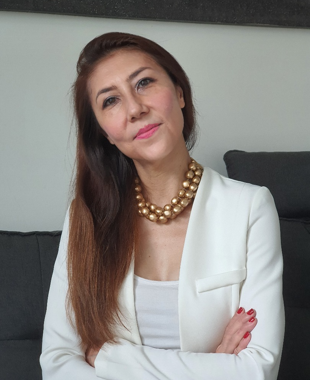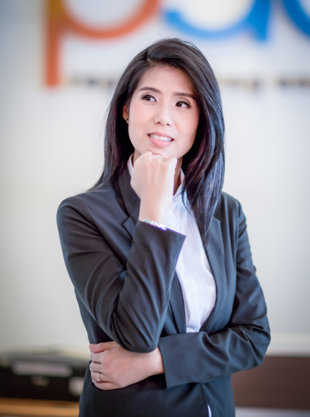Ask an entrepreneur: How can the Women’s Empowerment Principles (WEPs) create a more gender equal environment in business?
Date:
Authors: Yuki Aizawa, Soumita Basu, and Atchara Poomee
Editors: Minji Kwag and Thatphorn Nakkarasin
In celebration of Women’s Entrepreneurship Day on November 19th, WeEmpowerAsia (WEA) highlight efforts carried out by three committed women entrepreneurs and their businesses to create a more gender-inclusive and responsive society.

These stories showcase the vision and (expected) impacts that some of the outstanding women entrepreneurs participating in WEA-initiated programmes aim to bring to creating a more inclusive workplace, marketplace, and community.
Empowering women in the tech industry

Yuki Aizawa, co-founder and co-chief executive of Rinne Technologies & Consulting Sdn Bhd. (Malaysia), is a firm believer that women are “powerful thriving together towards common goals” as “women leaders elevate others." She stresses the importance of empowering women in the technology industry where the gender gap is especially severe.
Her company Rinne Technologies and Consulting aspires to help close this disparity. One of the company’s core values is empowering women in the technology sector by creating inclusive jobs, contributing to help women further develop and achieve higher skills, and find their purpose in their company and in the society.
“Slowly but surely, we will get to address this inequality,” says Aizawa. With a forward-thinking culture, she believes her company can encourage remote and digital ways of working for those who face challenges to show up to a workplace, be they cultural, religious, or physical reasons.
Aizawa co-founded Rinne Technologies, providing blockchain-backed solutions addressing financial inclusion and fighting deforestation. With a track record in the financial IT sector (both conventional and Islamic), her company is well placed to empower women and assist marginalized communities through technology in ethical financing:
Goal 1: Providing access to ethical financing, resulting in financial inclusion in particular of the unserved, underserved, ill-served, marginalized micro, small or medium-sized enterprises, or women business owners
Goal 2: Providing education – Financial literacy, knowledge of science, technology, economics and mathematics, up-skilling, and on-line learning
Goal 3: Creating jobs in tech industry for women, including the option of remote jobs, especially those who have challenges to work outside of their home for cultural, religious, or physical reasons
As a winner of the UN Women 2021 Malaysia Women’s Empowerment Principles (WEPs) Awards (in the category for small and medium-sized enterprises) organized by the WeEmpowerAsia programme, Aizawa is passionate about gender equality, and having the WEPs framework helps monitor progress with speed. She is also a newly appointed ambassador for the Malaysia chapter of the Women in Tech - Global movement, which aims to further improve cooperation on gender equality and women’s empowerment.
Compassion and inclusion keys to equality

Zyenika Inclusive Fashion in India was born to address the drastic exclusion and marginalization of some women in something as basic as clothes. Soumita Basu started it as a response to her own experience of not finding any clothes to fit after acquiring a severe disability. Zyenika makes clothes for different body types and disabilities that are easy, comfortable, quick, and painless to wear, while enhancing the scope of independent dressing. “Zyenika is about choice and dignity,” says Basu.
Zyenika is a woman-led organization that ensures key roles are held by women and people with disabilities. It has crafted a full value chain that promotes equality and inclusion and mindfully sources from marginalized communities, people with disabilities, and gender-inclusive organizations.
Basu says that “inclusion is the only way to leverage our true potential as a society” and that “empowerment is the product of many elements coming together,” as her company works towards empowering society, not just individuals.
Participating in WeEmpowerAsia’s Industry Disruptor programme co-led by the social enterprise training organization The DO, Basu was provided with access to mentorship, investors and the opportunity to grow her ideas and increase targeted impact through scaling her company. Through the programme, she also engaged with like-minded industry players, ranging from fellow entrepreneurs to corporates and investors, who are dedicated to changing the industry for the better.
For gender equality, Basu stresses that “we need to move from working on women empowerment in silos to making a space for all genders to be truly represented and responsive towards all voices. Women cannot be empowered if men are not sensitized, if the LGBTQ+ community is not included." She also emphasizes that “compassion is the key to equality, which makes us see through the clutter and addresses the root issues” and that “compassion is where the heart and mind meet."
Promoting women’s leadership and representation

PAC Corporation Co., Ltd. (Thailand) works in the field of clean technology. In this industry most of the business executives are men, says managing director Atchara Poomee. She finds that women executives can do the same job as men, or even contribute more, precisely because there are fewer female players in this industry both nationally and internationally.
Poomee has had the opportunity to participate in several projects on supporting women to play a key role in business, through which she found that there are still considerably few female entrepreneurs working in the field of science, technology, and innovation for small or medium-sized enterprises.
Such experience stimulated her interest in participating in the development of women entrepreneurs, so they can build stronger and more sustainable businesses. Her advocacy engagements include speaking at events that support gender equality, mentoring both female and male entrepreneurs, giving business consultations, and giving interviews to media, all of which aimed to inspire women entrepreneurs to self-motivate and improve. “I would like them to believe that they are capable, and, regardless of gender, we can succeed if we are determined,” says Poomee.
When she learned that the WeEmpowerAsia programme offers training on the WEPs in cooperation with the Kenan Foundation Asia, she was eager to join the programme to systematically develop and further promote gender equality in her organization.
“After joining the training,” she testifies, “I was very inspired both in terms of developing female executives in the company and promoting the welfare of all female employees in the workplace.” She sees that there are still many ways for her company to implement the WEPs policies, whether creating a more responsive marketplace or ensuring transparency in her organization.
Currently, PAC is developing policies to improve personnel development, promotion structure, and compensation for all employees to benefit equally from. Furthermore, the company is planning to take actions, follow up on the addressed matters and have the performance reported concretely. PAC will roll out the full implementation of the WEPs approach in 2022.
“Regardless of gender, everybody can develop themselves and be successful. They just need to be determined and confident that they are capable. We are ready to support every gender to have equal opportunities.” – Atchara Poomee
UN Women’s WeEmpowerAsia programme, funded by the European Union, aims to promote the leadership and participation of women in business across Asia and the Pacific region through its various training and accelerating programmes and other initiatives in the framework of the Women’s Empowerment Principles (WEPs).
To learn more about the WeEmpowerAsia programme and its initiatives, visit the website: http://weempowerasia.org/
To learn more about the entrepreneurs and their businesses, visit: